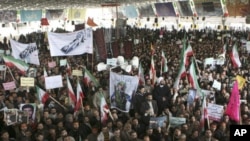The United States on Wednesday imposed sanctions against two key Iranian officials who were instrumental in crushing political protests there since 2009. The Basij militia leader and Tehran prosecutor are blamed for "significant" human rights abuses.
Officials here concede that the financial and travel sanctions might have little direct impact on the two Iranian officials, but they say they hope the increased notoriety stemming from the U.S. action will at least impede their activities.
The joint announcement from the U.S. State and Treasury Departments targets Abbas Jafari Dolatabadi, the Tehran prosecutor-general, and Mohamed Reza Naqdi, commander of the Basij militia forces of Iran’s Revolutionary Guards Corps.
The statement says Dolatabadi brought charges, including the death penalty, against scores of protestors who took part in the December 2009 uprising against the Tehran government that was violently put down by security forces.
Naqdi, the commander of the Basij militia, is described as being responsible for, and complicit with, the militia's abuses - including the deaths of protestors from late 2009 to last week, when the militia was out in force again to curb demonstrations.
The sanctions freeze all assets the two Iranians might have in U.S. financial institutions, bar travel by them to the United States and make it illegal for Americans to have financial dealings with them.
State Department Spokesman P.J. Crowley said the action shows the United States' commitment to Iranians seeking to exercise basic rights and solidarity with victims of torture and persecution, even though the sanctions might have limited affect.
"It’s a significant statement," said P.J. Crowley. "I can’t tell you how often they travel or what their level of personal riches are. All I can tell is that we have the authority to do this, and we have done this. And hopefully, it will complicate their lives."
Crowley noted the irony of comments made Wednesday by Iranian President Mahmoud Ahmadinejad who, according to the Iranian news agency, called the killing of protestors this week in Libya "unimaginable" and questioned how leaders could use guns and tanks against their own people.
Crowley said it is a question that Mr. Ahmadinejad must answer for his own people, given the Tehran government’s violent crackdown in 2009 and against subsequent public protests.
US Sanctions Iranian Officials for Crushing Protests












